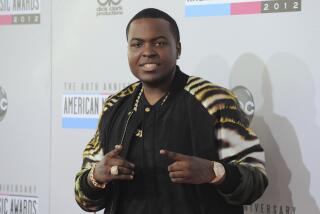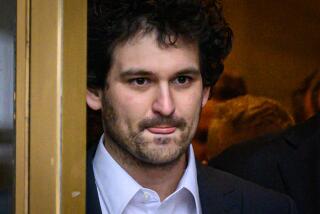‘Family’ Values Mean Free Lunches, Golf and Now a Share of the Big Bucks
In an industry that worships technology and burns people out like fuses, David Sun and John Tu made a fortune by doing something truly unconventional: treating their Fountain Valley-based Kingston Technology Corp. employees like family.
Perhaps it’s the free Friday lunches and company-subsidized golf outings. Or the fact that Sun and Tu eschew fancy titles, and their “offices” are plain-vanilla cubicles alongside those of employees. Or maybe it’s the above-market wages, benefits, profit sharing, bonuses and liberalized dress code (summed up by one worker as “no shorts”).
Whatever it is, the quirky computer memory company has found a formula for family values that has paid off handsomely--particularly for Sun and Tu. On Thursday, the owners revealed they will sell an 80% stake in their “family” business for a cool $1.5 billion to Japanese publisher Softbank Corp.
Such news might be expected to send employees streaming for the exits, resumes in hand. Indeed, some of Kingston’s 500 employees privately admitted feeling unsettled by Thursday’s developments.
But spirits rebounded when Sun told employees that he and Tu will continue to manage the company--and include them in the big payday.
Tu said a “very substantial” portion of the $1.1 billion in cash they’ll receive as part of the deal will be shared with Kingston’s 500 employees. He declined to specify exactly how much, but he said he and Sun are considering setting up trust funds, college funds, paying off workers’ mortgages or awarding bonuses equivalent to two years’ salary.
“They’ll be pretty well taken care of,” Tu said.
Sun and Tu started by handing out $1,000 bonuses to full-time employees Thursday and throwing a massive pizza party for workers that evening.
“Dave [Sun] said we deserved it since we had to listen to him make a speech,” said Darin Ferriola, a product manager for the firm. “He feels a responsibility for employees and wants the company to continue operating as it has been.”
Whether that can happen under new ownership remains to be seen. After all, the corporate scrap heap is littered with corpses of nifty start-ups like Kingston that turned to junk under big, new owners.
But in an industry where rags-to-riches stories are as commonplace as computer chips, Sun and Tu’s experience stands out for spawning a passionate devotion to the organization among the employees who helped it grow.
It can be seen in the company lobby, where a plaque lists “courtesy, compassion, modesty and honesty” as goals to aspire to. Or in a framed display of messages from employees addressed to Tu and Sun.
“Thanks for letting me be part of the family,” reads one.
*
Indeed, preserving the company’s culture weighed heavily on the founders’ minds as they mulled Softbank’s offer.
“I had many sleepless nights before we made this decision,” Tu said by phone from Japan. “Not because of money issues or anything else, only because of how employees would feel, how they would be affected and what would be the best decision for their future.”
In an age where employees are viewed as costs that need to be minimized, Sun and Tu set out to build a firm on the notion that workers perform best when they are treated well.
Tu described the company culture in October when Kingston achieved $1 billion in annual sales.
“Our philosophy of putting employees first and vendors second has automatically ensured that the customers receive the best possible care,” he said. “We are pleased that our success is proof of this practice.”
That philosophy includes giving credit where it’s due. So Kingston provided a lavish lunch and took out full-page newspaper ads in October to thank its employees by name for their contributions to its sales growth.
*
Veterans of less hospitable high-tech companies, Sun and Tu met in Orange County in 1981 and melded their seemingly opposite personalities into a solid working relationship. Tu, a soft-spoken, thoughtful native of Shanghai, showed a flair for marketing, while the outgoing, energetic Sun, who was born in Taiwan, handled the engineering side.
They sold their first memory components company to AST Research Inc. in 1986 for a reported $6 million. The stock market crash of 1987 wiped out their fortune, but the partners vowed to make it back again.
Turns out their timing in the computer industry was perfect. With $4,000 in cash, the partners launched Kingston just as the memory market began to skyrocket. Sales soared from $13 million in 1988 to $251 million in 1992, propelling Kingston to the No. 1 spot on Inc. magazine’s list of the fastest-growing private companies.
Having surpassed the $1-billion milestone, Kingston is rapidly closing in on $2 billion.
The company has been as generous to the community as to employees. Last year, Sun and Tu gave $400,000 to the Huntington Beach Union High School District to set up a scholarship fund for college-bound students from low-income families. It was the largest single scholarship donation in the district’s history.
Kingston donated another $400,000 this year to fund the completion of a new Boys and Girls Club facility in Fountain Valley.
Whether Kingston stays true to its hometown roots remains to be seen. But if Kingston’s new owners tamper with the culture that has led to the company’s success, no one will be sorrier than Kingston employees.
“Once you’ve been here it’s hard to think about working anyplace else,” said product manager Ray Wang. “It kind of ruins you.”
Times staff writer Greg Miller contributed to this report.
More to Read
Inside the business of entertainment
The Wide Shot brings you news, analysis and insights on everything from streaming wars to production — and what it all means for the future.
You may occasionally receive promotional content from the Los Angeles Times.










